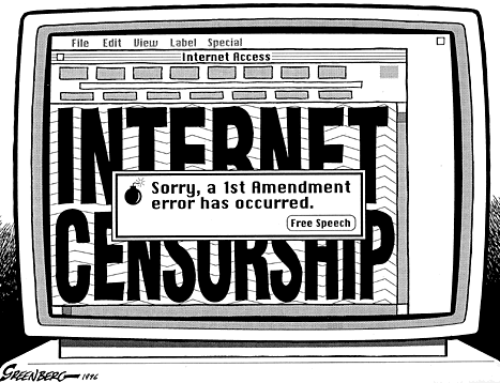What the public wants to know, power often prefers to keep secret. Particularly in this media-hostile climate, it is more important than ever to know how to access information and what rights you have as a member of the press or public. The law, after all, favors transparency and public participation – if you know how to use it.
I’ve been getting a lot of questions related to these issues lately: How do you find out what’s going on inside of government? Can the press be selectively excluded from press conferences? Can reporters be jailed for using confidential sources or disclosing government secrets? When can you be sued or prosecuted for publishing information?
To help you get the truth out, I’m going to begin a series of posts that address these questions and point you to helpful resources. If there’s something in particular you want to know about, let me know and I’ll do my best to get you the information.
Since Illinois is no stranger to efforts to shield the workings of government from the public eye, it strikes me that our state is a good place to start. Here are a few of the key information-gathering tools at your disposal in our state:
How to Know What’s Currently Going On: Actions by government are typically required to be open to the public for input and observation, but the myriad actions taken by agencies and other public offices can be difficult to track. How do you find out what’s going on? Every state agency (find a complete list with links to individual sites here) must publish notice of their activities and meeting schedules, including the opportunity for public comment. The weekly Illinois Register collects all of this information and more, and should be your go-to source in following legislative activity in a particular area. You can also use the search engine at Public Notice Illinois, which collects all notices published by newspapers in the state.
Illinois’ Freedom of Information Act (FOIA): You can obtain information from any “public body” by submitting a FOIA request. “Public body” includes agencies, universities, local governments, school districts and anyone else funded by the state. (This is different from the federal FOIA, which I’ll cover at another time.) All the information you need to do this can be found in Illinois’ FOIA statute. It is accessibly written, but here are a few answers to the most common questions:
- Who can file a FOIA request? Anyone – including individuals, corporations and non-profits.
- What can the information be used for? Any non-commercial purpose. As long as you’re not using the information to sell or market a product, you should be fine.
- What is included in “public records”? The definition is broad, and includes any written, recorded or electronically stored information. It also includes material in the possession of a private party that has been contracted to do public work.
- Does everything have to be disclosed? For the most part, yes. There are certain exceptions clearly identified in the statute. For example, agencies don’t have to disclose information that could interfere with an ongoing judicial or police investigation, jeopardize someone’s life, or reveal private information like social security numbers and personal addresses. But your request cannot be denied simply because a record contains confidential information. The agency must disclose the record with the non-disclosable information deleted or obscured – which lets you know what and how much has been withheld.
- How much does it cost? Each agency sets its own costs – typically free for up to 50 hardcopy pages, and 15 cents a page after that. However, you can choose to have the records produced electronically, and if they’re available in that format there is often no charge. In addition, if your request states the specific purpose for the request (which you’re ordinarily not required to disclose) and asserts that a waiver of the fees is in the public interest, the public body must produce the documents for reduced cost or free.
- Awesome, how do I do it? Every agency is required to publish their procedures and designate a FOIA contact person. This can often be found on the “About Us” or “Media” page. See, for example, the pages at the Forest Preserve of Cook County and Illinois State Board of Education. You’ll find other helpful information there, too. Don’t be afraid to call the FOIA officer to ask for help. Send a letter identifying what you’re looking for and they must respond within 5 days. Pro tip: Craft your request as specifically as possible so that you don’t end up with too much or too little information.
- What if I don’t get a response or they deny my request? If you don’t hear back, your first step should be a friendly call to the designated FOIA officer. But if you’re not getting the information you want after that, file an appeal within 60 days of your initial request with the General Access Counselor in Attorney General’s office. Include a copy of your request and a copy of any correspondence you’ve had with your target. If you still don’t get the results you want, you have the right to file a lawsuit (and if you win, the state has to cover your legal fees). If that’s intimidating, the Citizen’s Advocacy Center is a fantastic non-profit organization that can help. Give them a call or check out their FOIA Guide.
Open Meetings: If J-school or high-school was the last time you attended a public meeting, maybe it’s time to brush off those citizenship skills. Government must do its rulemaking in public, and you can attend, require answers to difficult questions and speak your mind. Check out how to do so in the Guide to Open Meetings and First Amendment published by the Citizen’s Advocacy Center, or the Attorney General’s Directive to State Government Agencies on open meeting requirements.
Citizen engagement is the key to holding our government accountable. As members of the press, you know that change often happens only because of your efforts to shine light on the policy-making process. If you’ve had experience using these tools, or if there’s a topic you’d like to know more about, I’d love to hear from you.






Leave A Comment